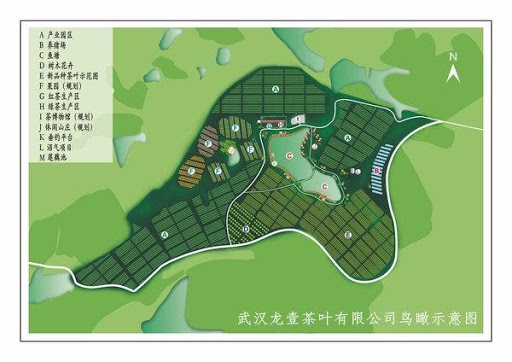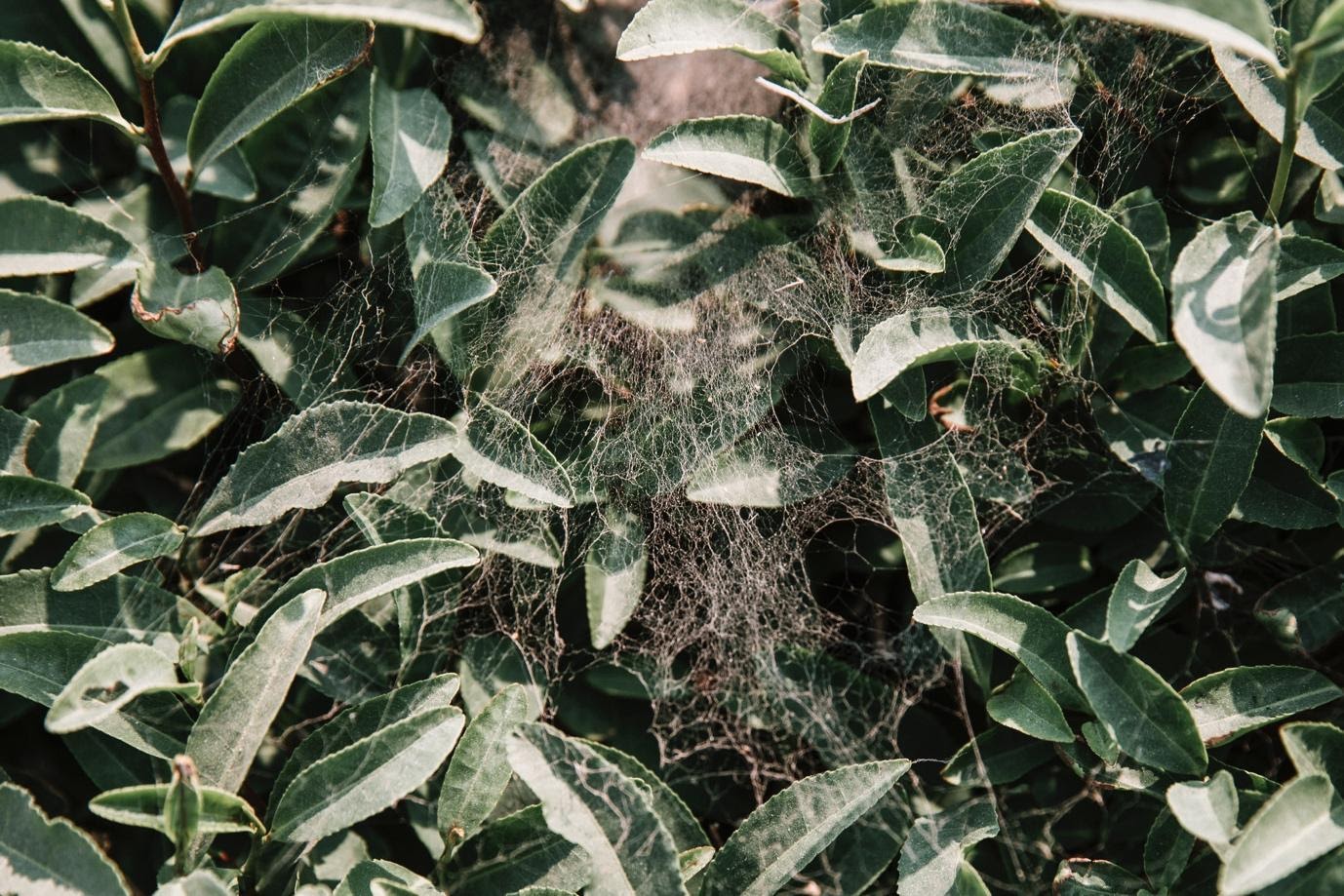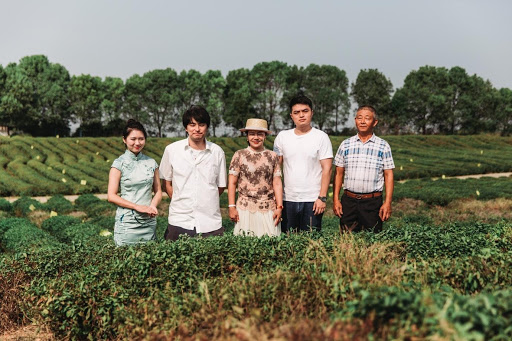Chasing Fragrance
To Dan Yan, tea is not simply a drink. It is an eight generation legacy from her family of tea growers. Reagan Tan, who met her in Wuhan in 2019 during a five-week Overseas Immersion Programme, finds out how she has put her own unique stamp on it.
Dan Yan is the family’s eighth generation of tea makers. Photo by Reagan Tan.
BY
REAGAN TAN
Published on
August 3, 2020
“Chasing Fragrance” symbolises Dan Yan’s lifelong dedication to her family’s tea-growing business. It signifies her pursuit of the perfect tea. It is also the name of the special blend of organic tea she created.
Such is the dogged commitment of Dan Yan, 50, who sold two houses to keep her family’s tradition alive. In 2010, Dan Yan bought a piece of land in Wuhan to continue her family’s tradition of tea growing.
She says: “Ten years ago, I found a scroll in my family home. An expert told me that my family had been in the tea business for eight generations.” The Dan family has been growing tea since 1860, in the county of Chibi, which is the site of the famous battle of the Chibi, or Red Cliff, during the Three Kingdoms period.
Not content with just continuing a family tradition, she wanted to produce quality tea and propel the Chinese culture of tea appreciation to the world.
“I wanted to create a cup of tea that gives back to nature. Because China is known for all its unsafe foods, I wanted to create tea that is safe, nutritious and of top quality,” Dan Yan adds.
I wanted to create a cup of tea that gives back to nature. Because China is known for all its unsafe foods, I wanted to create tea that is safe, nutritious and of top quality

The Long Yi Tea plantation consists of over 1,500 hectares of land. Photo courtesy of Dan Yan.
She then began the arduous task of producing organic tea on her land. It took three years to rid the land of harmful chemicals. The 1,500-hectare piece of land in the suburbs of Wuchang district now produces over 10,000 kilograms of organic black, green and red tea every year.
She takes pride in the fact that her teas are certified organic for the sixth year running by SGS, an independent consultant firm in Russia, which tests for 103 different contaminants affecting safety and quality.
Unlike other farmers who pride themselves on having the best-looking plantations, Ms Dan feels that her tea trees are not so luxuriant.
She says: “I let spiders spin the webs on the tea bushes. These spiders help protect the trees from pests by eating them. Spider webs are good signs that plantations are free of pesticide.”

Unlike other plantations, Ms Dan’s tea trees are covered in large spider webs, which she welcomes. Photo by Reagan Tan.
Instead of artificial fertilisers, her tea estate uses sesame and peanut pulp, and employs locals living around the plantation to harvest the tea leaves. She claims that the tea she produces has up to 16 times more nutrition than teas produced by other boutique tea brands.
Her exquisite line of organic teas fetches prices upwards of 999 yuan (S$200) for 120 grams. Ms Dan’s favourite tea is “Zhui Xiang” (追香), or Chasing Fragrance, a name she created. The light aroma, she adds, is more popular among the ladies.
Osmanthus flowers are first mixed with the tea leaves, then dried and removed by hand. This method of infusion originated from the Song Dynasty over 1,000 years ago. The tea’s unique characteristic, Dan Yan says, is “Wen Xiang Bu Jian Hua” (闻香不见花), which means that you get a whiff of the fragrance of osmanthus flowers but do not see the flowers in the tea.
“It does not matter whether the plantation is high up in the mountains, or in the lowest of valleys. What matters is the tree – how it is grown, harvested, and processed.”
Ms Dan often travels between her plantation and her tea house located in the Hankou district of Wuhan. “During the harvesting season, I will be at the plantation every other day, to check on the quality of our plantation and products.” Her unwavering dedication to quality is greatly respected by the rest of her team.

Dan Yan (centre) standing with the rest of her team at the Long Yi Tea plantation. Photo by Reagan Tan.
In line with her aim to show the world quality tea from China, Dan Yan has already branched out into other countries such as France, Germany and recently, Qatar. She hopes to be able to bring Long Yi Cha and chasing fragrance to Singapore, citing that “there will always be a market for quality products.” She believes that Singaporeans would appreciate good tea.
“Quality supports the brand and only quality keeps a brand for generations to come,” Dan Yan quips.
Quality supports the brand and only quality keeps a brand for generations to come.

I may need your help. I tried many ways but couldn’t solve it, but after reading your article, I think you have a way to help me. I’m looking forward for your reply. Thanks.
deep sleep
beautiful relaxing piano
Your article helped me a lot, is there any more related content? Thanks! https://accounts.binance.com/vi/register?ref=WTOZ531Y
Thanks for sharing. I read many of your blog posts, cool, your blog is very good. https://accounts.binance.com/kz/register-person?ref=UM6SMJM3
Thanks for sharing. I read many of your blog posts, cool, your blog is very good.
I don’t think the title of your article matches the content lol. Just kidding, mainly because I had some doubts after reading the article.
Your point of view caught my eye and was very interesting. Thanks. I have a question for you.
Thanks for sharing. I read many of your blog posts, cool, your blog is very good.
Your point of view caught my eye and was very interesting. Thanks. I have a question for you.
Thanks for sharing. I read many of your blog posts, cool, your blog is very good.
Your point of view caught my eye and was very interesting. Thanks. I have a question for you.
Recently, I wanted to buy Ciprofloxacin urgently and discovered this amazing site. It allows you to buy antibiotics without a prescription securely. If you have sinusitis, check this shop. Express delivery to USA. Check it out: buy antibiotics online. Cheers.
Recently, I had to find Zithromax without waiting and discovered a reliable pharmacy. They let you order meds no script safely. For treating strep throat, I recommend this site. Express delivery to USA. Link: https://antibioticsexpress.com/#. Highly recommended.
Lately, I was looking for Stromectol pills and discovered this source. You can get human grade meds delivered fast. If you need to treat infections quickly, visit this link: http://ivermectinexpress.com/#. Cheers
Yeni Pin Up giriş ünvanını axtarırsınızsa, doğru yerdesiniz. Bloklanmayan link vasitəsilə qeydiyyat olun və qazanmağa başlayın. Pulsuz fırlanmalar sizi gözləyir. Keçid: Pin Up yüklə uğurlar.
Salamlar, siz də yaxşı kazino axtarırsınızsa, mütləq Pin Up saytını yoxlayasınız. Ən yaxşı slotlar və rahat pul çıxarışı burada mövcuddur. İndi qoşulun və bonus qazanın. Sayta keçmək üçün link: Pin Up yüklə uğurlar hər kəsə!
Canlı casino oynamak isteyenler için kılavuz niteliğinde bir site: https://cassiteleri.us.org/# cassiteleri.us.org Hangi site güvenilir diye düşünmeyin. Editörlerimizin seçtiği bahis siteleri listesi ile rahatça oynayın. Detaylar linkte.
Yeni Pin Up giriş ünvanını axtarırsınızsa, doğru yerdesiniz. İşlək link vasitəsilə qeydiyyat olun və qazanmağa başlayın. Pulsuz fırlanmalar sizi gözləyir. Keçid: pinupaz.jp.net hamıya bol şans.
2026 yılında popüler olan casino siteleri hangileri? Detaylı liste web sitemizde mevcuttur. Bedava bahis veren siteleri ve güncel giriş linklerini paylaşıyoruz. Hemen tıklayın https://cassiteleri.us.org/# listeyi gör fırsatı kaçırmayın.
Bu sene popГјler olan casino siteleri hangileri? DetaylД± liste web sitemizde mevcuttur. Bedava bahis veren siteleri ve gГјncel giriЕџ linklerini paylaЕџД±yoruz. Hemen tД±klayД±n п»їhttps://cassiteleri.us.org/# bonus veren siteler kazanmaya baЕџlayД±n.
Selamlar, sağlam casino siteleri arıyorsanız, hazırladığımız listeye mutlaka göz atın. Lisanslı firmaları ve fırsatları sizin için inceledik. Güvenli oyun için doğru adres: https://cassiteleri.us.org/# siteyi incele iyi kazançlar.
Info slot gacor hari ini: mainkan Gate of Olympus atau Mahjong Ways di Bonaslot. Situs ini gampang menang dan resmi. Bonus new member menanti anda. Akses link: https://bonaslotind.us.com/# Bonaslot raih kemanangan.
Merhaba arkadaşlar, güvenilir casino siteleri arıyorsanız, hazırladığımız listeye kesinlikle göz atın. En iyi firmaları ve fırsatları sizin için inceledik. Güvenli oyun için doğru adres: güvenilir casino siteleri iyi kazançlar.
Hər vaxtınız xeyir, siz də etibarlı kazino axtarırsınızsa, mütləq Pin Up saytını yoxlayasınız. Canlı oyunlar və rahat pul çıxarışı burada mövcuddur. Qeydiyyatdan keçin və bonus qazanın. Sayta keçmək üçün link: Pin Up giriş uğurlar hər kəsə!
Pin-Up AZ Azərbaycanda ən populyar platformadır. Saytda minlərlə oyun və canlı dilerlər var. Qazancı kartınıza anında köçürürlər. Mobil tətbiqi də var, telefondan oynamaq çox rahatdır. Giriş linki Pin Up giriş tövsiyə edirəm.
Bocoran slot gacor hari ini: mainkan Gate of Olympus atau Mahjong Ways di Bonaslot. Website ini gampang menang dan resmi. Promo menarik menanti anda. Kunjungi: п»їBonaslot raih kemanangan.
Canlı casino oynamak isteyenler için kılavuz niteliğinde bir site: https://cassiteleri.us.org/# casino siteleri 2026 Hangi site güvenilir diye düşünmeyin. Editörlerimizin seçtiği bahis siteleri listesi ile rahatça oynayın. Tüm liste linkte.
Bonaslot adalah agen judi slot online terpercaya di Indonesia. Ribuan member sudah merasakan Jackpot sensasional disini. Proses depo WD super cepat hanya hitungan menit. Situs resmi slot gacor gas sekarang bosku.
Yeni Pin Up giriş ünvanını axtaranlar, doğru yerdesiniz. Bloklanmayan link vasitəsilə qeydiyyat olun və qazanmağa başlayın. Xoş gəldin bonusu sizi gözləyir. Keçid: https://pinupaz.jp.net/# Pin Up Azerbaijan hamıya bol şans.
Pin-Up AZ Azərbaycanda ən populyar kazino saytıdır. Saytda minlərlə oyun və Aviator var. Pulu kartınıza tez köçürürlər. Mobil tətbiqi də var, telefondan oynamaq çox rahatdır. Rəsmi sayt rəsmi sayt baxın.
Situs Bonaslot adalah bandar judi slot online nomor 1 di Indonesia. Banyak member sudah merasakan Maxwin sensasional disini. Proses depo WD super cepat kilat. Link alternatif п»їBonaslot login jangan sampai ketinggalan.
Info slot gacor hari ini: mainkan Gate of Olympus atau Mahjong Ways di Bonaslot. Situs ini gampang menang dan aman. Bonus new member menanti anda. Akses link: https://bonaslotind.us.com/# slot gacor hari ini dan menangkan.